All 13 entries tagged Inspiration
Quotes and media gathered from many sources as part of my research, development and design activities. Use these resources to inspire alternative perspectives on existing problems, or as a starting point in understanding unfamiliar situations.
View all 49 entries tagged Inspiration on Warwick Blogs | View entries tagged Inspiration at Technorati | There are no images tagged Inspiration on this blog
October 11, 2009
Ten Faces of Innovation slides
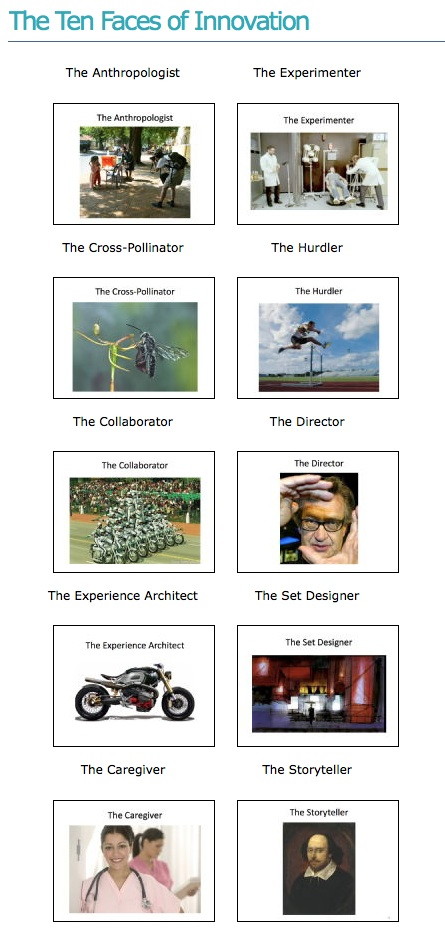 |
Here is a screen shot of the Ten Faces of Innovation slides that I have created to use in sessions for the Internation Design and Communication Management MA. Each slide represents one of the ten design team personas described by Tom Kelley in his excellent book. The photo of film director Wim Wenders was chosen so as to emphasis how attention to detail is a key attribute of the designer. The experience architect is illustrated by one of David Robb's (BMW) masterpieces. Motorcycles are of course the pinnacle of the experience architect's work. And I insist that BMW switchgear is intuitive! I'm now wondering if there are more personas that could be added? Definitely "the cheerleader". And for the British, "the tea maker". |
Quotes from Design Thinking by Tim Brown
A series of slides used in the first session of my Multimedia Communications workshops for the International Design and Communication Management MA.
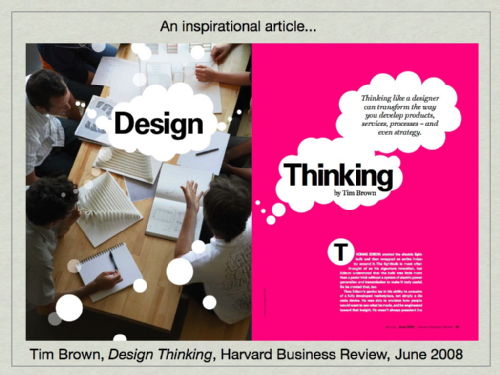
The challenge of design is getting more difficult. Conscious and un-conscious expectations and needs are multi-dimensional and sometimes hard to reconcile. A successful design might, for example, need to instill a sense of trustworthiness and reliablity, while at the same time containing an element of playfulness and the in-definite. Only by treating design as a process of discover, of empathy, of dialogue - design thinking - can we create great designs for sophisticated people and complex situations...
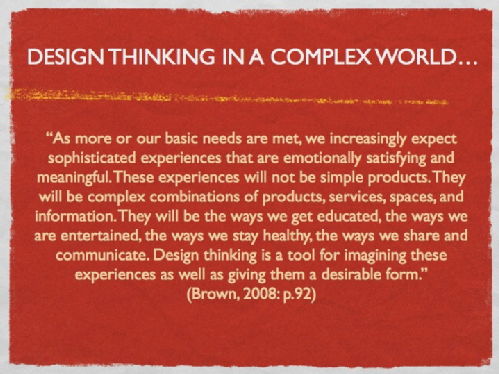
Iterate to discover and create. Discover, prototype, test and refine...
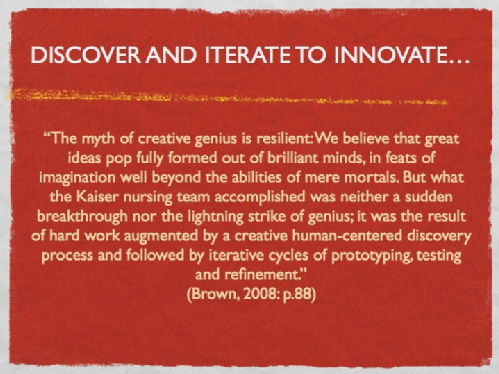
Move between the three spaces whenever necessary - allow inspiration to be disruptive of ideation, allow ideation to calm inspiration, don't move to far to implementation to early, but keep it in mind...
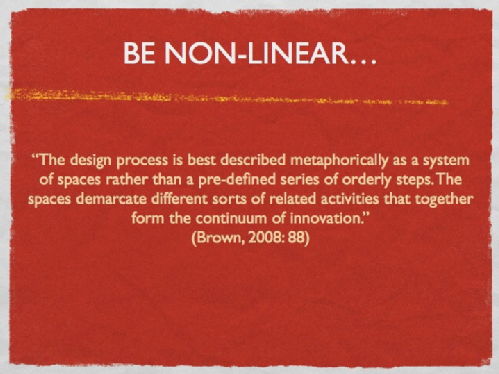
The three spaces...
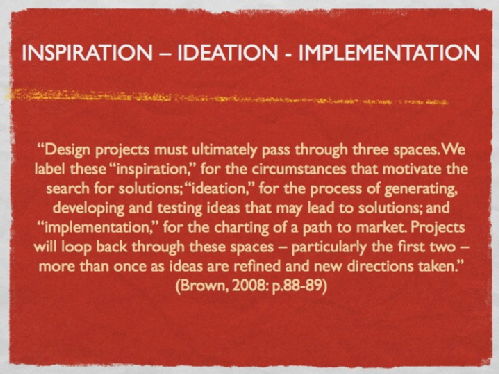
August 17, 2009
Use of microblogging (Twitter) as a research tool
I've just read an interesting article on the use of Twitter as a tool for building narrative representations of the learner experience. It is by Elizabeth Aspden and Louise Thorpe of Sheffield Hallam University, who are researching informal study patterns (i.e. outside of schedules classroom hours) and how students choose and use different learning spaces.
An account of the method was given in a recent edition of Educause Qaurterly1. They describe how they recruited 15 students for the study. Each student recorded an account of their use of learning space, at least 3 times a day. This was complemented with 3 longer summaries each week, and a final reflective interview.
Out of this they built a series of narratives2 outlining a typical day in the life of each student. For example, in Eric's story, we learn that he frequently uses empty classrooms as quiet on-campus study space. Imagine what might happen if, through a change in policy, those classrooms were to be locked when not in use.
This method sounds promising, and I think I will try to use it in my own research. How might it develop in the future? Imagine the students using a wifi enabled multimedia microblogging system to record their events: text, photos, video of their experiences immediately posted for access by the researchers. Come on Apple, build us a iPod Touch with a camera!
________________
1 Aspden, E. J. & Thorpe, L. P. "Where do you learn?": Tweeting to Inform Learning Space Development, Educause Quarterly Magazine, Volume 32, Number 1, 2009, http://www.educause.edu/EDUCAUSE+Quarterly/EDUCAUSEQuarterlyMagazineVolum/WhereDoYouLearnTweetingtoInfor/163852 [Accessed 17/08/2009]
2 Informal Learning group, Sheffield Hallam University, Informal Learning: Scenarios, http://shulearningspaces.wordpress.com/informal-learning-scenarios/ [Accessed 17/08/2009]
 Robert O'Toole
Robert O'Toole

 Please wait - comments are loading
Please wait - comments are loading





